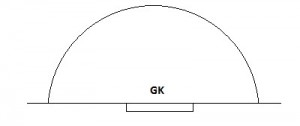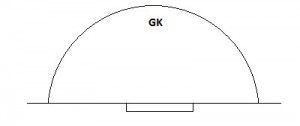As you look to move on from the basics of shot stopping and evolving your game as a goalkeeper, you need to think (perhaps thinking hard and conscientiously about it, if you want to!) about how you play as a goalkeeper, and your roles and responsibilities within the team. About how you need to work to intercept and interrupt passes by the opposition to stop them from gaining a chance to score. When you consider it, a goalkeeper should be able to shut down attacks and passing opportunities, providing a presence behind their defence that is able to do their job when the defensive line is ‘caught short’. You will see goalkeepers at the elite levels who play a more proactive style, rushing out to tackle or clear away the ball, especially in the indoor game, where being active and aggressive in challenging and intercepting a pass is really important for a goalkeeper to succeed in the fast paced indoor arena.
And you need to work on being confident stepping off your post or your “line”, if you are to challenge the opposition and restrict their opportunities in your D to score. Bringing in the ability to disrupt chances by coming out to tackle and so forth, you will be able to limit the opposition’s chances. Good shot stoppers are worth their weight in gold, but they also need to be able to have an important impact on their game in order to achieve success.
Pure shot stopper
All goalkeepers are shot stoppers, but some are more inclined to hope on their ability to make the save, perhaps expecting the defence to do the job of intercepting passes and for them to stay where they are. Rather than go out to challenge if needs call upon them to, unable to see past the lens of a goalkeeping simply being there to make the saves (that might have drawn them to the position in the first place) and the need to step out of goal at times to shut down a scoring chance by kicking away a loose ball or going in for a decisive tackle, for example. As a position in our sport, this is an important aspect of the way we play within the game, like football goalkeepers who need to come out and catch crosses on corners, or rush out to tackle, versus ice hockey goalies who are not going to come flying out of their zone to slide tackle a player (unless they’re Dominic Hasek!), or floorball, where it is more a case of shot stopping. And it needs recognising! For some, not others, probably though!!
In a negative way, you could consider a case example of a goalkeeper rooted to their line and fearful of coming out to tackle or intercept. But rather than coming out to challenge, in a positive light, they do themselves an injustice by staying back against the play and expecting a shot to be stoppable. Passively hoping to just have to stop shots instead of be involved in the play, even if a case of a difficult redirect is a potential possibility, say for example. Not confident in their ability to tackle, or just unable to see the point in doing so. A goalkeeper that stays where they are, on the spot, hoping that they will do ok facing a shot that might come in from the top of the D say, that doesn’t come out to tackle or chase lose rebounds, instead expecting to be able to stop all shots.
A ‘goal’ ‘keeper’
Goalkeeping is more than just being there to get behind shots and save them, unfortunately! And the way you approach goalkeeping will have a significant impact on the way you play. You can either be a goalkeeper where you expect to just be there to stop shots and end up not doing a good job of ‘owning your D’, or make sure this isn’t the case! If you take the structure of the word goalkeeper, you can literally get “goal” and “keep”; in this way of thinking, can you consider yourself a goalkeeper who ‘keeps’ their goal? Do you look after your D, or do you stay on your line and get beaten by chances that you could have stopped through coming out to challenge? Do you stop chances turning into goals by eliminating them before they happen, or do you get beaten by them?
Your job as a goalkeeper is more than just simply the saving aspect, there is also passes and potential breakaways to contend with! It’s about more than standing there and being on angle and in the right spot at the right time, all of the time. Wherein a goalkeeper needs to be able to come out and tackle or intercept and will be able to when these situations present themselves. Think about breakaways where you stand a better chance of rushing out to challenge, if you go in for that glorious slide tackle, where you will take the ball off the play and stop the shot happening in the first place. Or interceptions, where making the interception will eliminate the passing option and prevent a high risk scoring opportunity.
Goalkeeper versus shot stopper
When you think about, goalkeeping is more than just a case of shot stopping. You can’t expect to save every shot if you play like that, so making sure you actively play a part in shutting down scoring opportunities means that you can work things into your favour. As you develop and play more games and get more (as a beginner anyway!), you will soon realise and notice that it is more than just the save making that may have brought you to playing the position in the first place.
Sometimes you need to do more than just stop shots. The “sweeper keeper” idea and conceptualisation epitomises the way a goalkeeper can (attack being the best form of the defence!), with the goalkeeper making use of their aggressive abilities to shut down chances instead of having to make the potential save, acting like an extra defender in the way they are involving themselves in the game. Elite goalkeepers are more than just shot stoppers and capable of tackling and challenging appropriately, bringing an extra dimension to their game.
Take this video montage of world class Guus Vogels (who has obviously retired recently, leaving way for Stockmann to take over in his place, for Holland). Notice how amazing his shot stopping abilities are, but also how he is involving himself in the game, making important diving interceptions and challenges; diving off the post and reaching out with his stick say or sliding out to intercept a breakaway forward:
If you think about it, you need to be able to do this as well as make saves when it is right to. Eliminating scoring chances before they happen is an important part of goalkeeping as save making is and you need to know this! It may look good if you have stats where you face a lot of shots or end up saving a lot of shots, but that could also be down to poor rebound control or allowing scoring opportunities to happen by not being proactive like this, so it is important to reflect on the way you play and how you go about the concept of ‘keeping’ goal.
Be a goalkeeper!
Ultimately, you need to be more than just a shot stopper. And a goalkeeper at that! There is more of a responsibility to your team to help them out by challenging and doing the defensive work by coming out to intercept a breakaway among other roles. Therefore there are effectively two sides or parts to a goalkeeper: a shot stopper and an active ‘keeper’ of goal. And if you want to go far up the hockey ladder (or at least improve!), you need to be both! Any goalkeeper worth their weight in gold (or goalie legendary status, take the phrase as inspiration!), as already mentioned (oops with déjà vu!) is a great shot stopper but more importantly also a dominant force within the D. So, make sure you are able to do this, and be a goalkeeper and not just a save maker!
Elegant kvinnlighet spets brudklänning är 2017 bröllop inget undantag. Den känsliga spets brudklänning kan användas för att beskriva en tunn spets täcker bara bröst och skulderlinjen , skapa extraordinära skönhet, det ser mycket attraktiv.

